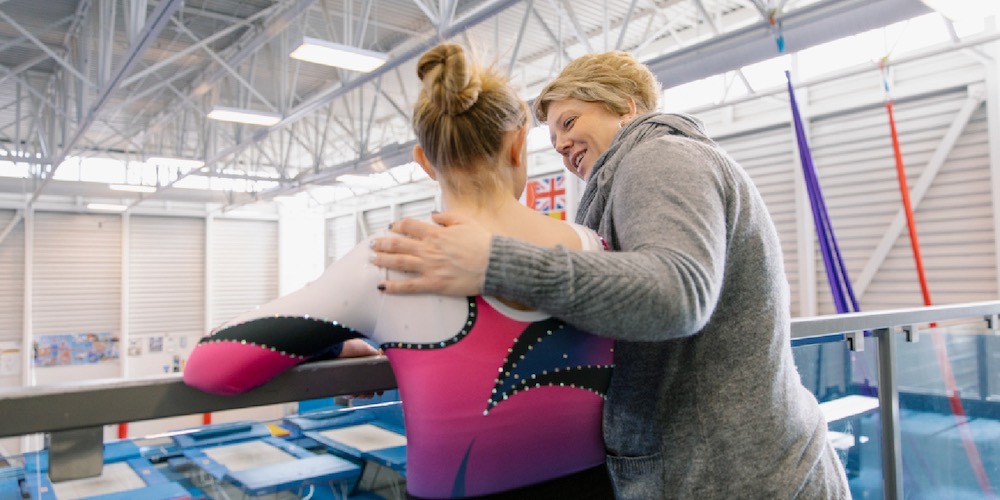Balancing Emotions: A Parent’s Guide to Mental Health in Gymnastics

Just as a well-executed routine requires strength, flexibility, and precision, nurturing your young gymnast’s mental health demands attention, care, and understanding. Let’s explore how you can support your child’s mental well-being as they tumble, flip, and soar through their gymnastics journey.
The Mental Apparatus: Understanding Your Young Gymnast’s Mindset
Gymnastics isn’t just about physical prowess, it’s a mental game too. Your child faces unique challenges:
- Perfectionism: The pursuit of the perfect 10.0 can be overwhelming.
- Fear: Attempting new skills or recovering from falls can induce anxiety.
- Body image concerns: The sport’s emphasis on aesthetics and form can significantly impact self-perception and confidence.
- High-pressure situations: Competition nerves can affect performance.
Recognizing these challenges is the first step in helping your gymnast maintain a healthy mindset.
Balancing Act: Emotional Support Techniques
- Spot Their Emotions: Just as coaches can spot difficult moves, be there to help support your gymnast’s emotional needs, especially regarding body image concerns. Listen actively and validate their feelings.
- Flexibility in Thinking: Encourage mental flexibility about performance and body image. Help them see that one fall doesn’t define their entire performance.
- Dismounting Negative Thoughts: Teach them to dismount from negative self-talk. Replace “I’m not good enough” with “I’m improving every day.”
- Routine of Positivity: Develop a pre-performance routine that includes body-positive affirmations. “My body is powerful, skilled, and ready to perform!”
- Handling the Fall: Losing is part of the sport. Encourage your gymnast to view losses as learning opportunities. “What can I improve for next time?” is more productive than “I’m a failure.”
- Vault Over Slumps: When in a performance slump, teach your gymnasts to remind themselves, “This is temporary. I’ve overcome challenges before, and I will again.” When struggling with body image, teach your gymnast to say, “My worth isn’t determined by my appearance. I’m valued for my skills, dedication, and character.”
The Parent’s Routine: Your Role in Mental Health
Your approach can significantly impact your gymnast’s body image and mental state:
- Warm-Up: Start conversations about feelings and body image regularly, not just after competitions or when issues arise.
- Main Event: Focus on effort and progress, not just medals and scores. “Your form on the beam has really improved!” resonates more than “Why didn’t you win?”
- Cool-Down: After events, allow time for emotional processing before discussing performance.
- Recovery: Recognize signs of burnout or excessive stress. Sometimes, a break is as important as practice.
- Open Communication Channel: Encourage your gymnast to express their feelings to you. Say, “I’m here to listen, not judge. What’s on your mind?”
- What You Say: Words matter no matter who you’re talking to. Practice healthy self-talk with yourself as well. Children pick up on what we say to ourselves and others.
- Have a Backup Plan: Knowing you can be covered in case of an emergency, like an injury or illness, can vastly improve your mental health in tough situations. Consider sports insurance and/or registration reimbursement plans to help give you reassurance.
When to Bring in a Specialist
Just as you’d consult a physical therapist for a persistent injury, don’t hesitate to seek professional mental health support if you notice:
- Prolonged changes in mood or behavior
- Persistent negative comments about body shape or size
- Extreme dieting or exercise behaviors
- Loss of interest in gymnastics or other activities
- Expressions of hopelessness or worthlessness
- Significant changes in appetite or sleep patterns
- Inability to cope with competition pressure or fear of specific skills
Early intervention can help prevent minor concerns from becoming major obstacles.
Sticking the Landing: Long-term Mental Health Strategies
- Build a Supportive Team: Foster connections with coaches and teammates. A strong support system is important.
- Set Realistic Goals: Work with your gymnast to set achievable targets that focus on skill, not appearance. Progress is a marathon, not a sprint.
- Celebrate the Journey: Acknowledge efforts and body functionality, not just appearance or results.
- Maintain Balance: Encourage interests outside of gymnastics to help develop a well-rounded identity.
- Practice Pressure Management: Simulate competition scenarios in practice to help build confidence in high-pressure situations.
Remember, just as gymnasts must find their center on the balance beam, they need to find emotional equilibrium too. Your role is to help provide the stable base from which they can confidently perform their life’s routines.
By implementing these strategies, you’re not just raising a gymnast, but you can also help nurture a resilient, confident individual who can face life’s challenges with the grace and strength they display in the gym. Here’s to raising mentally strong gymnasts who can stick the landing in sports and in life!
Flip Into Coverage: Help Protect Your Young Gymnast
Stick the landing with pomi’s youth gymnastics insurance! Whether you choose one plan or pair both, your gymnast can be protected from the twists and tumbles life brings.

